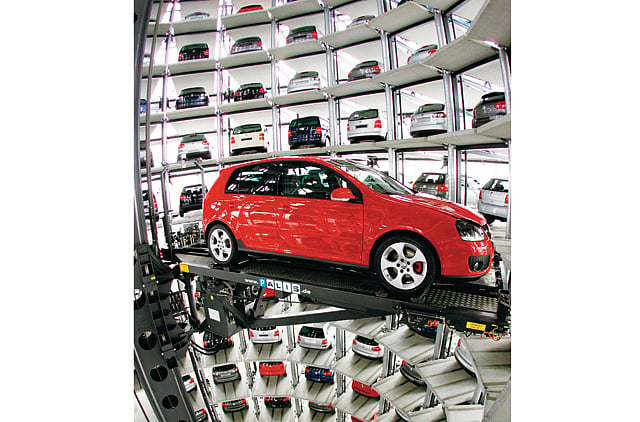Sharing the spoils
Lured by the benefits of investing in an economic powerhouse with a favourable legal framework, foreign investors are making a beeline for Germany

Germany is the largest economy in Europe and the fourth-largest in the world, with its nominal GDP behind the US, China and Japan, according to the International Monetary Fund. Its economy is based on the service sector, industry and, to a lesser extent, agriculture. Does this make Germany an investment destination?
A nation with such a highly developed economy is not in urgent need of additional foreign investment. It is the other way round: foreign investors looking for an attractive location within the European Union simply can't ignore Germany. They realise that the country makes it as easy as possible to start a business or invest in a partnership.
Germany is open to almost all kinds of foreign investment. There are nearly no sector restrictions. There is no legal distinction between domestic and foreign investment or company foundations. Moreover, the legal framework in Germany supports free trade and limitless transfer of funds internationally.
"More and more companies [have discovered] Germany as a safe and profitable investment destination. Between 2005 and 2010, the volume of foreign direct investments increased by 42 per cent to €509 billion (Dh2,569 billion)," says Thomas Bozoyan, Senior Manager, Germany Trade and Invest, a government-backed agency based in Berlin to promote foreign trade and investment in Germany. "More than 55,000 foreign companies with three million staff have branches in Germany."
Increase in investment
According to a 2011 UN Conference on Trade and Development report, Germany ranks fifth worldwide among the recipients of foreign direct investment. Most of them originate from within the European Union and other European countries, but investment from non-European countries are increasing, especially from Asia. For example, foreign direct investment from China and India increased by 100 per cent since 2006.
One of the biggest advantages of investing or starting a business in Germany is, without doubt, the highly developed infrastructure, which grants a speedy and efficient access to all of Europe. Many overseas investors see Germany as a gateway to the rest of the EU and, as there are no trade restrictions between the 27 member states of the bloc and the same currency is used in 17, trade and business can't be easier.
Furthermore, Germany has a skilled labour force with good command of English and a developed scientific and technological infrastructure. Hundred per cent foreign ownership is allowed in most sectors, and there is no discrimination in terms of taxation or bureaucracy against foreign companies. There is also no difference in the benefits granted to foreign or domestic investors. The benefits include investment grants, low-interest loans and tax reliefs, depending on the location and the size of the company. As a general rule, investment in small to medium-sized enterprises and in eastern Germany and East Berlin receive better incentives.
Main sectors
Areas to invest are manifold. Most of the foreign direct investment in greenfield projects between 2003 and 2010 went into information and communication technologies and software (18 per cent), financial and corporate services (15 per cent), cars and machinery (15 per cent), chemicals, plastics and paper (8 per cent), as well as electronics and semiconductors (7 per cent), according to a 2011 country research paper by fDi Markets.
Other areas of investment include transport and logistics, consumer goods, pharmaceuticals and biotech, textiles, power and commodities, hospitality and tourism, and renewable energy.
Potential investors from the Middle East will have to be aware that doing business in Europe generally means a high-tax environment. However, a comparison of European and international corporate taxation by the German finance ministry reveals that Germany's rate ranks in the lower half of the industrial nations. Corporations can expect a tax rate between 23 and 30 per cent, which is higher than in eastern European countries, but lower than, for example, in Spain, Italy, France or Belgium, and lower than in Canada, Japan and the US, where corporate taxation can reach 40 per cent.
After the reunification of Western and Eastern Germany in 1990, the German government has put much effort into the eastern regions. Since then, productivity has risen rapidly, and thanks to special incentives and subsidies, a lot of foreign companies have chosen the east as their operating base, including the biggest investor, US microchip manufacturer AMD.
Germany is promoting investment in the east, especially in cleantech industries such as solar energy, nanotechnology, biotechnology, information and communication technologies, health industry, and optical technologies.
Growth funds
For those who don't prefer direct investment, there are options to participate in the power of the German economy by investing in growth funds. Rob Smith, Manager, Baring German Growth Trust, wrote in his latest fund comment. "The enduring strength of Europe's biggest economy, which has been demonstrated by the latest business sentiment surveys and an improved growth forecast for 2011, underlines our view that we are in a golden age for investing in value-adding German companies."
Baring is confident that allocation to German equity will remain strong despite the lure of emerging markets for many funds.
"They [emerging markets] are expensive to invest in, while Germany is cheap and there is a lot more liquidity," Smith said. He added that German quality attracts Chinese investors, who, for example, have a soft spot for German cars. "Germany happens to have the biggest exposure to Asia."
German business relations with the Middle East are generally healthy. Some sovereign wealth funds of the region have bought stakes in German companies — well-known examples are Qatar Investment Authority's 17 per cent stake in Volkswagen and almost 9.1 per cent in construction company Hochtief.
Sign up for the Daily Briefing
Get the latest news and updates straight to your inbox
Network Links
GN StoreDownload our app
© Al Nisr Publishing LLC 2026. All rights reserved.